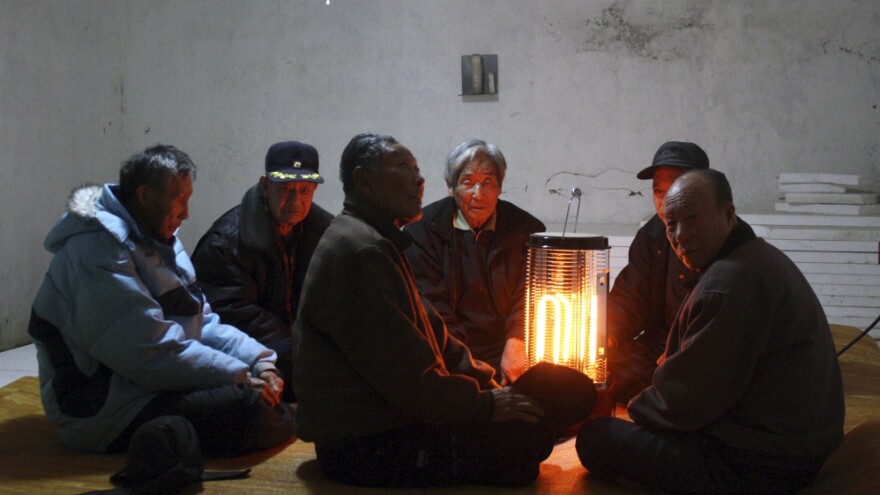South Korea conducted live-fire military drills near its disputed sea boundary with North Korea Monday, despite Pyongyang's threat to respond with a "merciless" attack.
North Korea did not carry out the threat as it focuses on internal stability two months after the death of longtime leader Kim Jong Il and prepares for nuclear disarmament talks with the United States later this week. But with American forces scheduled to conduct additional military exercises with ally South Korea over the next few months, tensions are expected to remain high in the region.
Washington and North Korea's neighbors are closely watching how new leader Kim Jong Un, the late Kim Jong Il's son, navigates strained ties with rival South Korea, the planned U.S.-South Korean military drills, and a long-running standoff over the country's nuclear weapons programs.
South Korea's drills took place Monday in an area of the Yellow Sea that North Korea targeted with an artillery attack that killed four South Koreans in 2010, and raised fears of a wider conflict. North Korea didn't threaten similar South Korean firing drills in the area in January, but it called the latest exercise a "premeditated military provocation" and warned it would retaliate for what it considers an attack on its territory.
A North Korean officer told an Associated Press staffer in Pyongyang Sunday that North Koreans would respond to any provocation with "merciless retaliatory strikes."
North Korea is prepared for a "total war," and the drills will lead to a "complete collapse" of ties between the two Koreas, the North's Committee for the Peaceful Reunification of Korea said in a statement carried Monday by the official Korean Central News Agency.
Such rhetoric has been typical of North Korean media in the past.
Later Monday, South Korean troops on five islands near the disputed sea boundary fired artillery into waters southward, away from nearby North Korea, a South Korean Defense Ministry official said on condition of anonymity, citing department rules.
North Korea's military maintained increased vigilance during Monday's drills, which ended after about two hours, though Seoul saw nothing suspicious, a South Korean Joint Chiefs of Staff officer said on condition of anonymity.

South Korean military officials said they were ready to repel any attack. Residents on the front-line islands were asked to go to underground shelters before the drills started, officials said.
Analysts said that North Korea's threats allow it to show its anger over what it sees as a violation of its territory — but that an immediate attack was unlikely during what is a delicate time for inter-Korean and U.S.-North Korean relations, and for internal North Korean politics.
"South Korea's military would have immediately responded this time, and that's something that North Korea can't afford" during its transfer of power to Kim Jong Un, said Yoo Ho-yeol, a professor at Korea University in South Korea.
The North's threat appeared aimed at mustering internal support or could be the result of top military officers showing their loyalty to Kim Jong Un, Yoo said.
The North knows that raising tensions ahead of nuclear talks with the United States won't be advantageous, said Cheong Seong-chang, an analyst at the private Sejong Institute in South Korea.
The Korean peninsula has been technically at war for about 60 years. The maritime line separating the countries was drawn by the U.S.-led U.N. Command without Pyongyang's consent at the close of the 1950-53 Korean War, which ended with a truce, not a peace treaty. North Korea routinely argues that the line should run farther south.
Relations between the Koreas plummeted following the November 2010 shelling of front-line Yeonpyeong Island, seven miles from North Korean shores, as well as a deadly warship sinking in March of that year blamed on Pyongyang. North Korea has flatly denied its involvement in the sinking, which killed 46 South Korean sailors.
Kim Jong Un's handling of North Korea's military and diplomacy will come into sharper focus the next several weeks.
The United States and North Korea will have important nuclear disarmament talks Thursday — the third round of bilateral talks since last summer and the first since Kim Jong Il's Dec. 17 death. They are aimed at restarting six-nation aid-for-disarmament negotiations on North Korea's nuclear program.
The North pulled out of those negotiations in early 2009, but it has said it is willing to restart the six-party talks, which also include China, Japan, Russia and South Korea. But the U.S. and its allies are demanding that the North first prove that it is sincere about ending its nuclear weapons program.
Additionally, a series of military exercises between the United States and South Korea will extend over more than two months. Seoul and Washington say their long-planned annual drills are defensive in nature; North Korea calls them preparation for an invasion.
South Korea began joint anti-submarine drills Monday with the United States, but the training site is farther south from the disputed sea boundary, South Korean military officials said. About 28,500 U.S. troops are stationed in South Korea, as what U.S. and South Korean officials call deterrence against North Korean aggression.
South Korean and U.S. troops will start 12 days of largely computer-simulated war games next week, along with two months of field training drills in early March.
Early Monday, the powerful Political Bureau of the Central Committee of North Korea's ruling Workers' Party announced it would convene a conference in mid-April to "glorify" the late leader and to rally around his son.
The conference could wrap up the North's power succession process, analyst Cheong said, with Kim Jong Un possibly promoted to general secretary of the Workers' Party, the ruling party's top job and one of the country's highest positions.
Copyright 2021 NPR. To see more, visit https://www.npr.org.

